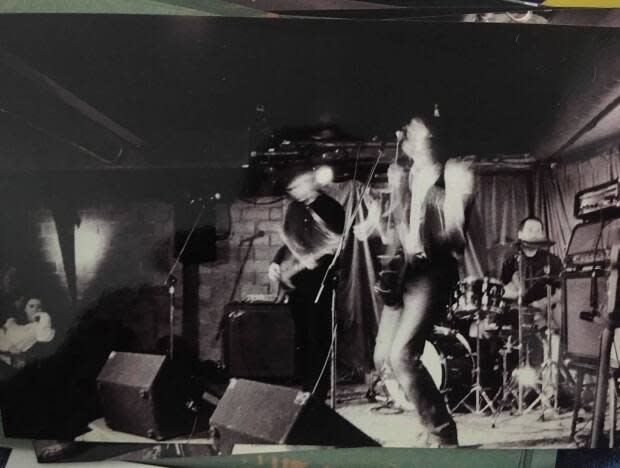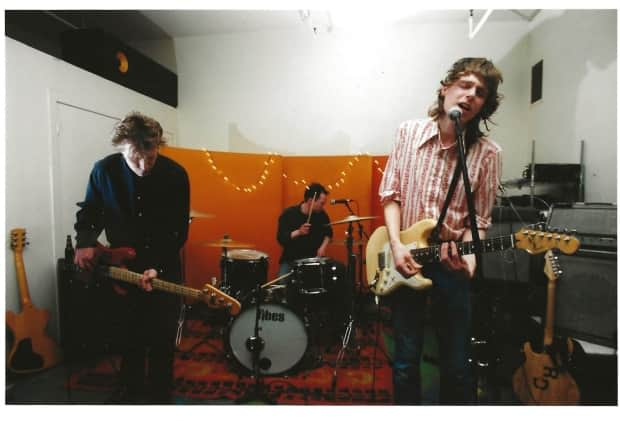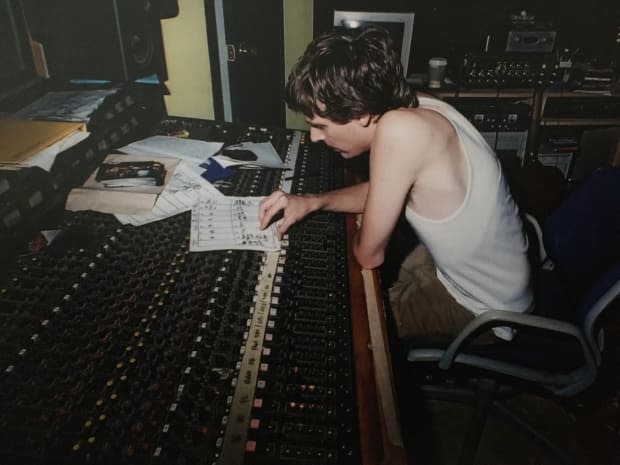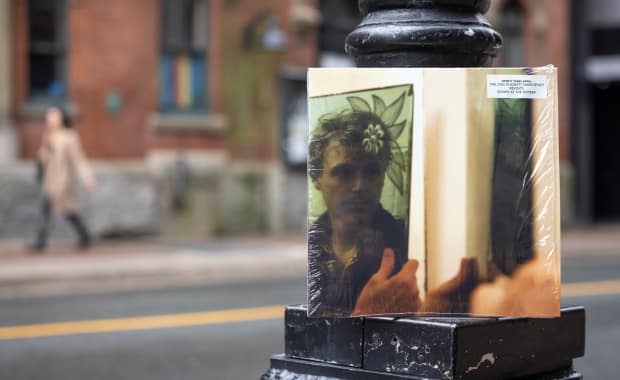2 decades after Down at the Khyber, the Joel Plaskett Emergency re-records landmark album

Just before this millennium hit, Joel Plaskett found himself at a crossroads.
Thrush Hermit, the band he was in since his early teens and for about a decade, had played its final show in December 1999.
"I didn't have university under my belt," said Plaskett, now 46. "I didn't have a backup plan, so when the Hermit disbanded, I was determined ... I wasn't ready to move on to a different phase. I was like, 'Music's what I do now.'"
While Plaskett put out his first solo album, In Need of Medical Attention, around the time Thrush Hermit disbanded, the indie-folk record was a side project. His efforts were going to be focused on putting together a rock trio that became the Joel Plaskett Emergency.
He knew who he wanted for bandmates.

On a New Year's Eve trip to Cape Breton, Plaskett successfully recruited bassist Tim Brennan.
Brennan had previously played in an incarnation of Halifax band Blackpool with veteran drummer Dave Marsh. They would form the trio's rhythm section.
Within a year of this trip, the Emergency recorded the acclaimed album, Down at the Khyber, which later ranked No. 46 in Bob Mersereau's The Top 100 Canadian Albums, alongside albums by icons such as Rush, Neil Young, Joni Mitchell and The Guess Who.
"The Khyber record was the transition point where it was do it yourself, put it together, figure it out again and go," said Plaskett.
Gone were the days of being on a major label as he was with Thrush Hermit. Plaskett now steered his career without the help of a manager and the support a label provides.
As the band went about writing and arranging songs — several of which were written during the Thrush Hermit days — the Emergency played shows at venues in Halifax such as the Khyber Club, the Attic and Hell's Kitchen.

To fill those venues, Plaskett would create 11 x 17-inch posters to attract concertgoers.
He was often spotted throughout the city stapling the posters to power poles, from Halifax's north end to the Dalhousie University campus. Sometimes city workers would remove the posters, forcing Plaskett to go back a second time.
"I tried to hit all the neighbourhoods and people were coming up to the shows," said Plaskett. "I don't know if the postering did it, but it didn't hurt."
As buzz surrounding the Emergency grew, the group began recording Down at the Khyber in late 2000. Recorded at the Khyber Building at 1588 Barrington St., the Emergency often played shows at the club on the first floor and even rented rehearsal space on the third floor.

There was also a recording studio on the third floor. It wasn't ideal. Small and featuring low ceilings, these challenges presented an opportunity. The aim was to "make it sound like Led Zeppelin on really cheap gear," said Plaskett.
The band's creative use of the space shows up on songs like Light of the Moon, where the acoustic portion of the song was recorded in the fire escape to take advantage of the reverb there.
Recording the drums was done by setting microphones at a distance, resulting in the "smashed drum sounds" heard on a song like Cry Together.
"We were trying to work with the limitations of the space and just make something sound cool and unique," said Plaskett. "That's what's neat about the original Khyber recording is we're working with what we've got and I think we found some personality."
In 2001, Down at the Khyber was released to widespread acclaim and was later nominated for Best Alternative Album at the 2002 Junos.

The album was the launching pad for the second act of Plaskett's career, which is still going strong after three decades in the music industry. Since Plaskett left Thrush Hermit, he's been a part of seven Juno nominations and has won once.
Sidelined until recently from touring amid the COVID-19 pandemic, the downtime has given Plaskett the opportunity to do some live streams performing songs from previous albums, such as his 2009 solo album, Three.
Revisiting Down at the Khyber
Given the 20th anniversary of Down at the Khyber's release, Plaskett decided to re-record the album for a live stream with Marsh (who has been the Emergency's drummer since day one) and the two bassists who have predominantly played in the group.
Brennan, the original bassist, plays on side A of the re-recording, while Chris Pennell, who has been with the group since 2006, plays on side B.
Much like the original recording, the album was mostly played live as a three piece. Recorded at Plaskett's studio in Dartmouth, N.S., there were some overdubs, including adding background vocals, some guitars and some organ.

"I really like the first record," said Plaskett. "It has a lot of charm, my singing is still pretty young and pitchy and has some personality, but I do feel like I've become a better singer.
"And so I enjoyed singing on this revisiting one because I could really dig into the songs in a different way. Having sung them for 20 years, I felt like I could almost sing them in the way that I was maybe aspiring to back then, but wasn't necessarily able to hit in the same way."

The four musicians didn't rehearse for the show and Plaskett said around two-thirds of the recordings were done in one take.
Twenty Years Gone: The Joel Plaskett Emergency Revisits Down at the Khyber is now out on a limited vinyl-only release, but Plaskett said it will likely be put out soon digitally.
Recording the album had special meaning for Plaskett.

"In the context of the pandemic and having not played, it felt really important to me and really worthwhile and uplifting and sort of emotional in little ways," he said.
"Because those songs come from a time in my life where there was a lot going on and it was an exciting time and It was a transition from the Hermit days into the Emergency and that record."
One example is a line from the song Down at the Khyber: "I met my love down at the Khyber."
The line's origin came from the experience of filming the video for Thrush Hermit's French Inhale, which was shot at the Khyber. The makeup artist for the video, Rebecca Kraatz, was friends with the director and flew in from Toronto to work on it. She later shot the cover image used on both the original and rerecorded versions of Down at the Khyber.
"Down at the Khyber was smack dab in the middle of us, [Rebecca and I], really digging into our life together," said Plaskett.
"And so, yeah, the songs all have kind of a resonance based on the time in the life where they come from, the people I was playing with, Dave and Timmy, as well as their connection to who I am as a person and to the people around me, my wife Rebecca included."
MORE TOP STORIES

 Yahoo Movies
Yahoo Movies 